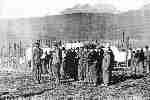
|
Roll-call at the Castle Mountain internment camp, Alberta, 1915 (Photo from the G.W.H. Millican Collection, courtesy of the Glenbow Museum) |
On Saturday, we will pause to remember how our young nation was moulded in the crucible of war. Stories of bravery, sacrifice and death will be recounted.
But one story of war is little known. It's been officially neglected. It's a story of injustice and a denial of civil rights' that happened far from the theatres of war.
Banff National Park was about as far backstage as the war got in 1914. Yet, under the brooding splendor of Castle Mountain, a heart-wrenching drama was played out behind barbed wire. For hundreds of incarcerated Ukrainian Canadians, today's pleasure ground was their prison.
Tourist traffic now speeds by remnants of the Castle Mountain internment camp, one of 26 across Canada, sites which included Jasper, Field and Revelstoke.
The Ukrainians, mostly men between 28 and 35, were arrested, stripped of their civil rights and imprisoned.
Their crime? They were recent immigrants to Canada who held Austrian passports and as such were declared aliens of "enemy nationality." Under the War Measures Act - which was later used against Japanese Canadians in 1941 and Quebecers in 1970 - 88,000 people were declared enemy aliens and were required to report regularly to police with their identity papers.
Ukraine, the bread-basket of Europe, had variously been fought over and divided by the continent's feuding powers. At the time of the First World War, the traditional Ukrainian regions of Galicia and Bukovyna were under the control of the Austro Hungarian Empire.
In total, 8,579 so-called enemy aliens were incarcerated. Of them, the Ukrainian Canadian Committee has estimated that 5,000 were Canadians of Ukrainian origin - ironically, many of whom had fled the old country to avoid compulsory service in the Austrian military.
"Mostly, their crime was to be without work. Some people were unable to speak English, some didn't know they had to register with police," says Bohdan Kordan, a political science professor at Grant MacEwan College in Edmonton.
Kordan says the British were shocked by Canada's xenophobic reaction and attempted to inform authorities that Ukrainians did not support the Austrian war effort and were, therefore, no threat to national security.
Still, the Canadian government persisted. These Ruthenians or Galicians, as the term Ukrainians did not become universally used until later, lost their homes and their money.
And they were expected to work. Not just to keep up their camps, but as cheap labor for the parks, the railways, and private concerns like coal mines and logging companies. They were exploited for 25 cents a day.
"Without their forced labor," says Kordan, "the growth of tourist potential in the national park would have been retarded by 20 or 30 years." Internees crushed stone for roads, sidewalks, hotels and bridges, cleared land and even built a ski jump and golf course.
The internees lived without newspapers. Their correspondence was censored. Mental illness was not uncommon. Escape and suicide were attempted. By 1920, 107 had died in the camps.
Presumably, few survivors remain today. There are few individuals willing to be outraged by this abrogation of the fundamental contract between the state and its people. Nevertheless, the Ukrainian-Canadian community as a whole deserves an apology from the Mulroney government just as it apologized last year to Japanese Canadians interned during the Second World War.
Research should be commissioned so that Parks Canada literature and displays tell visitors of the contributions made by Ukrainian internees.
But, typically, the government's attention is focused elsewhere. Sources say Prime Minister Brian Mulroney will open a Canadian consulate in the ancient Ukrainian capital of Kiev when he makes his historic visit to the Soviet Union later this month.
Before we start making these overtures, the Ukrainian community deserves to have the historic record set straight here.
This was just one of the first cases of immigrants being singled out for national humiliation mainly because they were on the lowest rung of the ladder. Until Canada acknowledges its mistakes and realizes that the country still suffers from an irrational fear of incoming immigrants, we will be doomed to repeat history.
(Mushka is the Herald's senior editorial writer.)
![]() Return to Righting An Injustice Page
Return to Righting An Injustice Page
![]() Return to Internment of Ukrainians in Canada 1914-1920 Page
Return to Internment of Ukrainians in Canada 1914-1920 Page
![]() Return to Ukrainian History Page
Return to Ukrainian History Page
![]() Return to InfoUkes Home Page
Return to InfoUkes Home Page
Document URL: http://www.infoukes.com/history/internment/booklet02/doc-046.html
Copyright © 1994 Ukrainian Canadian Civil Liberties Association
Copyright © 1994 Lubomyr Luciuk
We acknowledge the help in the preparation of this document by Amanda Anderson
Page layout, design, integration, and maintenance by G.W. Kokodyniak and V. Pawlowsky
Copyright © 1996-1997 InfoUkes Inc.
E-mail: internment@infoukes.com
|
since Mar 1 1997 |
InfoUkes Inc. Suite 185, 3044 Bloor Street West Etobicoke, Ontario, Canada M8X 2Y8 Tel: (416) 236-4865 Fax: (416) 766-5704 |
Originally Composed: Tuesday December 3rd 1996.
Date last modified: Thursday October 30th 1997.